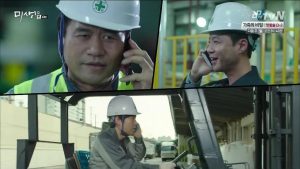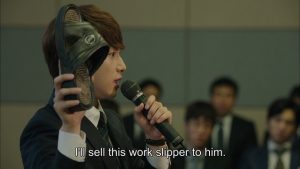Symnopsis: Geu-rae and Seok-yool stumble in their presentation speech but still impress in their engagement of ideas. A week later, Geu-rae waits for results.
The job market seems to be divided into 3 main categories: blue collar or physically labor intensive jobs, white collar or office jobs, and service jobs. In western nations, it seems that if you are making a good income, the job title does not seem to affect people’s self-esteem. However, in South Korea, there are strong societal perceptions on the occupation with people favoring white collar jobs (Kim et al. 2016, 227). A study found that there is an association between occupational classification and depression in Korea; where “blue collar and sales and service worker groups exhibit higher depression scores than their white collar counterparts, implying the importance of addressing these groups” (Kim et al. 2016, 227).White collar jobs seem to gain high status, as these jobs usually require degrees of higher education, and “in many economically advanced western societies, higher education has been transformed from an elite system to a mass system” (Kim and Choi 2015, 436-437). Even though decent jobs are not guaranteed with a higher education, due to the issue of educational inflation, this societal belief of status classification still exists (Kim and Choi 2015, 457).


In the drama, Misaeng, we can see the character, Seok-yool, struggle growing up under a blue collar supported family. Seok-yool’s father struggled working a low paying, labor intensive job, and as his coworkers threatened to strike, he could not get involved as big companies threaten to fire these men with families to support. Although he loved his father and is seen throughout the episode: preaching blue collar jobs by appreciating hard work and perseverance; there are flashbacks of him growing up, being mocked by his peers around him for having a father who doesn’t work in an office setting. This shows why some people in Korea feel ashamed for not being ‘accomplished’ in life by working service or blue collar jobs instead of working a white collar job. Seok-yool aims to make his father proud by following Korean society’s expectations of young men like himself, by rising in status by getting a white collar job while still appreciating and representing the blue collar workers.

the argument of which job is more important is found, when Geu-rae tries to sell his product to Seok-yool in the internship test: a slipper. Both ends of the industry are crucial to the other existing. Blue collar workers produce the good for the white collar workers to go sell, providing both a job. The drama sends a message to the audience; that office workers and blue collar workers are both needed to running Korea’s economy, and people must change their perceptions of occupational status stratification.
Questions:
How can we change Korea’s perceptions around white collar and blue collar jobs?
How can Korea get large companies to provide fair wages and enforce safety in labour intensive, factory jobs without the needs for strike and threats of job cuts?
Photos are screenshots from the drama, no copyright infringement is intended.
Works Cited:
Kim et al. “The impact of occupation according to income on depressive symptoms in South Korean individuals: Findings from the Korean Welfare Panel Study.”International Journal of Social Psychiatry 62, no. 3 (January 2016): 227-234.
Kim, Doo Hwan and Yool Choi. “The Irony of the Unchecked Growth of Higher Education in South Korea: Crystallization of Class Cleavages and Intensifying Status Competition.” Development and Society 44, no. 3 (2015): 435-463.
Kim, Won-seok, dir. Misaeng. Number 3 Pictures, 2014. https://www.netflix.com/watch/80165296?tctx=0%2C0%2C2ccd12e1-70d7-46d9-8aae-7ac139b241fa-124328052%2C%2C.
Hi Helen, I very much enjoyed this episode and your blog took the words out of my thoughts. To answer your first question, I think the media is a powerful tool in increasing awareness for many topics of discourse. By using the media as a way of communicating with Korea, we can value blue-collar workers and respect them equally with white-collar workers. The drama is a great example that takes attention to the blue-collar workers’ hard work to the economy, and in turn are being credited for their contribution. Both Geu-rae and Seok-yool make very valid arguments regarding the different types of workers’ values during their presentations. However, the sad reality within companies is that there is a hierarchy within every business. The white-collar workers will always stand on top of the blue-collar workers, not because the white-collar workers work harder, but because they have different responsibilities placed on a higher rank among them. Seok-yool suggested that the blue-collar workers are just as hardworking as white-collar workers, which is arguably true since without them, the pyramid would fall. However, there is not much we can do to change this order of status. Alternatively, the government can be their to provide rules and laws for companies to follow in terms of compensating workers fairly. These regulations should allow a business to run in an ethical manner, and would help workers feed their families and to provide everyone a basic standard of living.
Hi Helen, I like the way you discuss the difference between blue collar and white collar. To answer your questions, every industry has its value. It just people want to classify the different level of people through power and wealth. People usually think the job of blue collar doesn’t need lots of education. We also mention this in our class, undergraduates don’t want to do these labour-intensive jobs regardless the payment. To let people know the importance of blue collar is necessary. More social security and insurance are important to provide them enforce safety in labour intensive jobs. These factory jobs need more fair wages and the cost of labour need to be raised compared to the western country.
Hi Helen,
I enjoyed your analysis to the difference between blue collar and white collar jobs, especially within k-dramaland. Reading in between the scenes, the class distinctions and treatment towards the workers, is so prominent in some of these scenes that reflects just how realistic this social reality is, and could elicit some jawdropping action and sighing to this frustrating reality.
To answer your questions:
1) As mentioned in the discussion, both white collar and blue collar jobs coexist, and are much needed to run society as a whole – “one cannot have one without the other” in terms of yin and yang representing harmony – regardless of ideologies of class and status. Throughout this episode, it highlights perfectly how important their roles are in business operation from Seok-yool and Geu-rae’s arguments in their presentation.
Due to society favouring certain jobs (i.e. white collar vs. blue collar) and like to make comparisons within the job nature, creates contradicting dualities of: higher vs. lower status (seniority), upper vs. lower class, white collar vs. blue collar, etc. shows the disparities between these categories – which are seen within the episodes of the drama as well – by its value. While educating the public that both fields are necessary, maybe providing qualifications (e.g. certificate in trades
2) As Yutian pointed out in her post, major corporations or companies in Korea could provide more social security, insurance and work safety programs in heavy or intense labour jobs/work environments for fair wages and work safety to avoid strikes and job cut threats. This could mean drastically reshaping the trades or blue collar industries, etc., may create distribution across these fields. Perhaps restructuring the management of these programs, and providing the necessary resources (with government funding or support) to the misconception(s) and attitudes of blue collar jobs ‘do not require’ higher levels of education, could encourage more to pursue this field. Placing emphasis or value on obtaining or receiving education in these sectors, whether if that be trades, or blue collar jobs, etc. (e.g. perhaps the company could fund a portion for the potential employee to receive education to certain blue collar jobs, and certification to operate X, Y, Z machinery, etc. at these blue collar jobs) could encourage others that this field is worthwhile and creating a sense of work stability to work at these companies.
Sorry for the late reply.
1) To change Korea’s perceptions around white and blue-collar jobs, the government must get involved. What that means is that in order for blue-collar jobs to gain recognition, the government must give a higher wage for them. As one can see in Canada, many people are looking towards an office job. This means that blue-collar workers are low on the supply end. Since there are less workers in those jobs, their wages are high. From this, it changes the society’s view on trades. Because trades can give a stable and high-income job, the stigma is gone towards blue-collar workers. Korea’s government can do the same by promoting trades. They can give incentives such as free education for those in trades and also allow higher cost to hire a tradesman. Doing so will change the society’s view on blue-collar workers.
2) Korea can use tax cuts to incentivise safety in labour. If a company is able to keep a low accident rate, they can get a tax cut. This figure should be determined by the government and not the company. If a person is to go to a hospital to get treated, they should tell if it is a work-related injury. If it is, then it goes on record that the person is hurt from working. Fair wages can also be done through the minimum wage policy. There should be a flexible minimum wage for different types of job. If it is a factory worker, they should at least get x amount to be good. Also, this figure should account for inflation and will be adjusted by the CPI (consumer price index).
Thinking about this group at dinner tonight… hoping some of you come to the conference tomorrow^^ To meet the writer of Misaeng, of course.
Helen, great job bringing up such an important topic. Certainly blue collar jobs are perceived and appreciated very differently in Canada and South Korea. But I would suggest that you be more careful with using the phrase “western nations” because western nations are all different too. You could be more specific and limit the range to Canada, perhaps. And I notice a few mistakes in your in-text citations and your bibliography–we all know that Dr. Saeji is very strict about the Chicago style, so be careful with citations & biblio too!
Change (Kim et al. 227, 2016) to (Kim et al. 2016, 227) or (Ibid, 227)
Kim et al (–> write out the names). “The impact of occupation according to income on depressive symptoms in South Korean individuals: Findings from the Korean Welfare Panel Study (Capitalize the first letters).”International Journal of Social Psychiatry 62, no. 3 (January 2016): 227-234. Accessed June 2, 2018.(Don’t need access date)